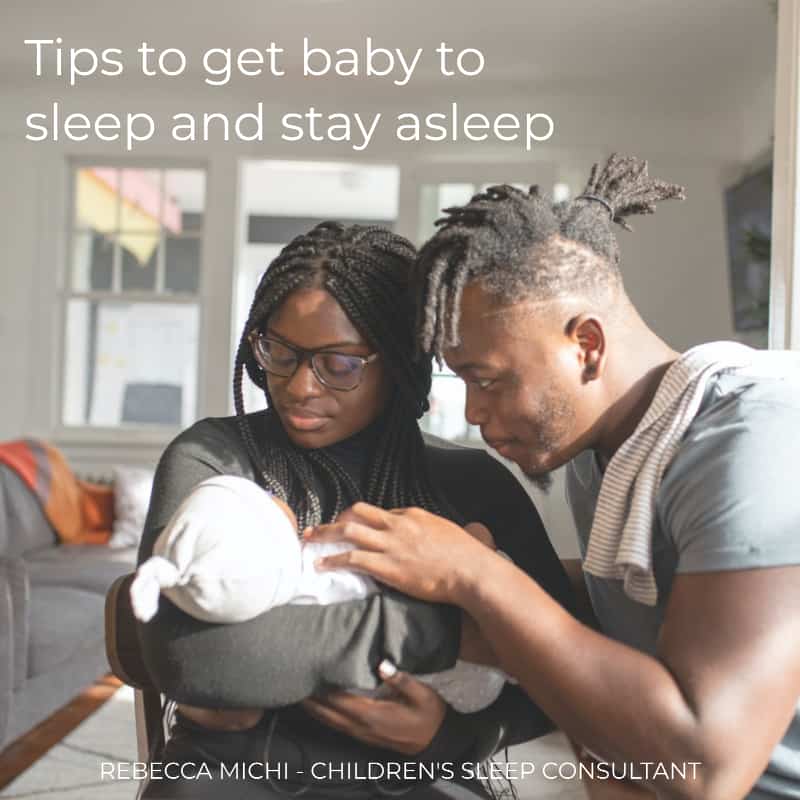Tips to Get Baby to Sleep and Stay Asleep
One of the most common queries I receive regularly is how to help baby to stay asleep once they drift off. Believe me; it’s not as easy as it sounds! As human beings, we all wake up at various points through the night, so staying asleep isn’t really the issue here- it’s more a case of helping your baby to go back into another sleep cycle without any disruption to the night’s sleep as a whole. So how can we do it? Read on to find out my top three tips to get baby to sleep and stay asleep…

Before we begin
Before we begin, I want to point out that how you get your baby to sleep is not of issue here. In many cases, how you get your baby to sleep will be how you get them back to sleep when they wake up, but it really doesn’t matter for the sake of this post. You might rock your baby; you might feed your baby, you might sing to your baby. If it works, it works. And if you’re happy with your chosen method, then stick with it. Babies like consistency, so don’t go changing it if it’s working right now. And it’s worth noting that whatever your chosen method, you can still get your baby to stay asleep for some good stretches during the night.
Allow your baby to sleep where they sleep best.
So this is a really gentle sleep training tip and one that I truly believe works for most babies that are struggling to stay asleep. Think of it like this. If your baby only falls asleep with you beside them in your bed, imagine how they must feel when they wake to find you’re not there? They may be in their own bed, having been transferred once asleep. Depending on their temperament, this can be hugely stressful for some babies.
If you don’t want your baby to share your bed, then it makes sense, in this case, to teach your baby to fall asleep in their own bed. If you’re ok with them being in your bed to fall asleep, then it may be that they spend the whole night there too, in an effort to get a better night’s sleep. Some babies have an acute sense of separation anxiety and need to sleep close to their parents to feel safe and relaxed. And it’s this feeling of safety and being relaxed that will help them sleep better. READ THIS POST FOR INFORMATION ON SAFE BED SHARING.
Be mindful of how you respond when your baby wakes up.
I get it; I really do. You’re exhausted by now. Your baby is frequently waking, and all you want is to get a couple more hours of sleep before you have to get up and face the day. So the thought of bringing baby in with you or giving them a quick feed to settle back to sleep again is obviously very attractive. Why spend ages settling baby in another way when you know one of the above will do the trick much more quickly?
I always recommend parents are mindful of how they respond to their babies when they wake. Please spend some time assessing exactly why they have woken. Add more and more help as you need to. When your child first wakes, listen and see if they fully wake up and are upset. Just because they are awake doesn’t mean they need help. Only help if they are asking for some help (they’ll cry if they need help); you never know they may be able to get themselves back to sleep. If they do require help try not to over help. You don’t have to pick them up straight away and feed or rock them back to sleep. You can try just placing your hands on your child initially. Does this help? If not, jiggle them a little, then add some shushing or talking. Keep adding more and more help as needed. You don’t have to wait for a long time before adding more help; you’ll know if your support is helping or not within a few seconds. By adding more help as needed, you’re not over helping your child; you’re giving them the support they need in order to get back to sleep.
Eliminate disturbances
This might seem obvious, but sometimes there can be subtle changes you can make that will help your baby to sleep for longer stretches at night time. There can be changes made to the nursery environment- temperature, blackout blinds, finding that small electronic toy that beeps now and then… and there are other changes you can make too. Make sure you check your baby’s diaper when they wake, and make sure you can rule out a stuffy nose or a dry throat, etc. Some babies find certain fabrics on their nightclothes irritating; some babies might have dietary issues or allergies keeping them awake. Work with your baby and allow them to lead you on this. Remind other family members not to stomp around at bedtime, or slam doors, etc. Some babies are hypersensitive to noises and can wake easily as a result. Similarly, some babies like to have a little hustle and bustle to help them get to sleep… only you know best!



